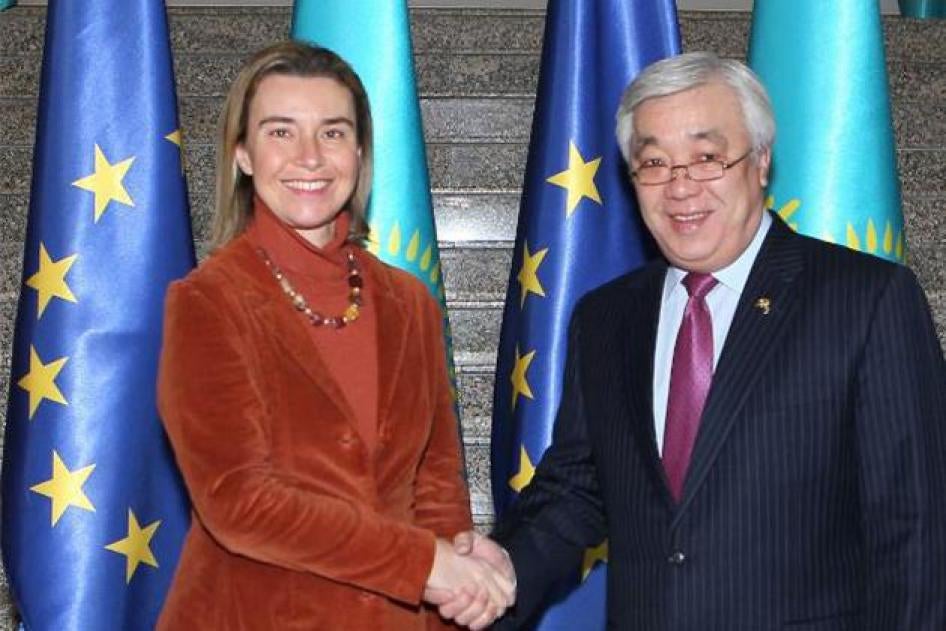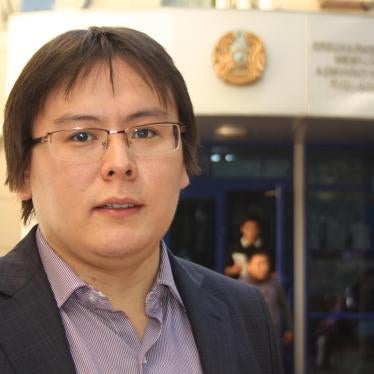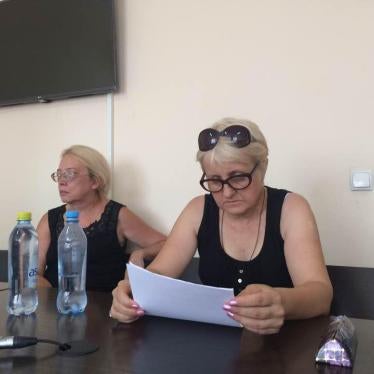The European Parliament stands poised to ratify the first Enhanced Partnership and Cooperation Agreement (PCA) with a Central Asian country. This deal showcases the deepened relationship between Kazakhstan and the European Union, and provides for greater trade and business relations between them.
Significantly, the agreement specifies that in their cooperation, Kazakhstan and the EU will “attach particular importance” to human rights and fundamental freedoms.
Kazakhstan has freely violated rights, however, since the agreement was signed. In mid-November, the European Parliament delayed consideration of the agreement, which the EP needs to ratify before it can fully go into effect. This offers the European Commission an 11th hour opportunity to send its Kazakh counterparts the unequivocal message that meaningful reforms will help seal the deal.
In its draft resolution accompanying the agreement, the text of which has been agreed upon by all political parties and is now public, the European Parliament gives meaning to the broad human rights language in the agreement itself, rightly calling for the “release of all activists and political prisoners currently in jail,” and denouncing routine restrictions to free speech and media freedom. The Parliament’s resolution points at Kazakhstan’s use of excessively broad Criminal Code article on inciting social discord against activists and journalists. It urges Kazakhstan to revise its 2014 trade union law, which restricts labor rights, and denounces the attacks on the country’s labor movement and their leaders.
These are critical and specific human rights concerns that should guide the European Commission’s dealings with Kazakhstan’s leaders.
In the years the EU spent negotiating the content of the enhanced PCA with the Kazakh government, it forfeited an important opportunity to condition progress in negotiations with meaningful human rights reforms in Kazakhstan. Meaningful improvements weren’t forthcoming then and they haven’t been forthcoming in the last two years either.
Since the EU’s top diplomat, Federica Mogherini, formally signed the agreement with her Kazakh counterpart Erlan Idrissov on 21 December 2015, Kazakh authorities have renewed efforts to silence their critics. In May 2016, Kazakh authorities arrested the activists Max Bokaev and Talgat Ayan for their role in organising peaceful protests against an unpopular proposed amendment to Kazakhstan’s land law. In November 2016, Bokaev and Ayan were sentenced to five years in jail and banned from engaging in civic activities following a trial that fell short of international fair trial standards.
Authorities have continued to restrict media freedom and target critical journalists, and have harrassed human rights organizations with unjustified tax inspections. Most recently, in September, an Almaty court convicted Zhanbolat Mamay, editor of the independent Sayasy Kalam: Tribuna newspaper, on politically motivated money laundering charges and banned him from journalism for three years.
Beginning in last December, Kazakh authorities began a concerted large-scale crackdown on the independent trade union movement, forcibly shutting down the country’s main independent nation-wide trade union, bringing its leader, Larisa Kharkova, to court in apparent retaliation for her trade union activism and banning her from leadership positions in trade unions for five years. Her freedom of movement is also restricted. Two other union leaders, Nurbek Kushakbaev and Amin Yeleusinov, were imprisoned earlier this year after they organized a peaceful protest deemed illegal by the authorities.
As the EU’s new agreement with Kazakhstan is expected to boost trade and business, Brussels should be seriously concerned about dealing with a partner that prevents independent trade unions from operating and attacks their leaders.
On November 29, the EU holds its annual human rights dialogue with Kazakhstan. The first week of December, the EU will host the five Central Asian Justice Ministers in Brussels. Other high-level meetings are in the pipeline for early 2018. These meetings give EU officials a final chance to relay to Kazakhstan that a deeper partnership cannot go ahead as long as critics are jailed and a free media suppressed.
Doing so is in the EU’s own interest, to ensure that its political and economic relations with Kazakhstan are not undermined by the absence of independent counterpowers in Kazakhstan’s business and industrial sectors.
Perhaps then, there will be no further delay green-lighting enhanced EU-Kazakhstan relations.











